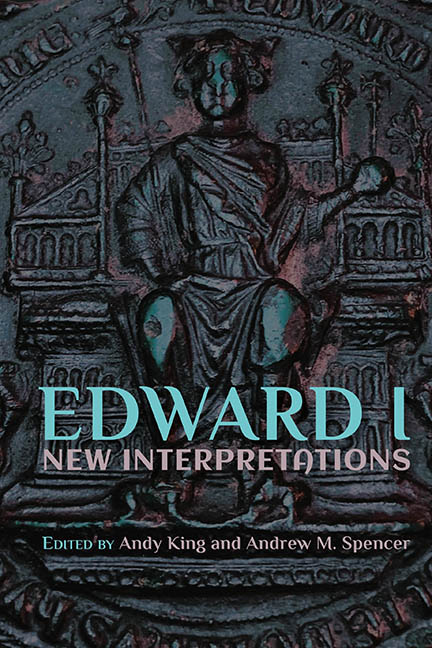Book contents
- Frontmatter
- Contents
- List of Contributors
- Acknowledgments
- Abbreviations
- Genealogy of Edward I
- Introduction
- 1 The Lord Edward and the Administration of Justice across his Apanage, 1254–72
- 2 A Tale of Two Ministers: Robert Burnell, Walter Langton and the Government of Edward I
- 3 Law and Order in the Reign of Edward I: Some New Thoughts
- 4 Magnates, Ritual and Commensality at Royal Assemblies: Bogo de Clare and Edward I’s Easter Parliament, 1285
- 5 Royal Daughters and Diplomacy at the Court of Edward I
- 6 Hearts and Bodies: Edward I and the Scottish Magnates, 1296–1307
- 7 Edward I and the Blessed Virgin Mary
- 8 Letters and Political Discourse under Edward I
- 9 Crisis? What Crisis? 1297 and the Civil War that Never Was
- Index
3 - Law and Order in the Reign of Edward I: Some New Thoughts
Published online by Cambridge University Press: 21 March 2020
- Frontmatter
- Contents
- List of Contributors
- Acknowledgments
- Abbreviations
- Genealogy of Edward I
- Introduction
- 1 The Lord Edward and the Administration of Justice across his Apanage, 1254–72
- 2 A Tale of Two Ministers: Robert Burnell, Walter Langton and the Government of Edward I
- 3 Law and Order in the Reign of Edward I: Some New Thoughts
- 4 Magnates, Ritual and Commensality at Royal Assemblies: Bogo de Clare and Edward I’s Easter Parliament, 1285
- 5 Royal Daughters and Diplomacy at the Court of Edward I
- 6 Hearts and Bodies: Edward I and the Scottish Magnates, 1296–1307
- 7 Edward I and the Blessed Virgin Mary
- 8 Letters and Political Discourse under Edward I
- 9 Crisis? What Crisis? 1297 and the Civil War that Never Was
- Index
Summary
IN 1979 Richard Kaeuper published an important article on law and order in medieval England. Although its title indicated a fourteenth-century focus, Kaeuper reached back to the beginning of Edward I's reign in his discussion, which concentrated particularly on special commissions of oyer and terminer. These commissions, which appointed justices to hear evidence and reach judgment in the localities in respect of all manner of felonies and trespasses, were granted at the request of individual or communal petitioners. They expanded dramatically at the start of Edward's reign. Kaeuper's study of them was extensive and innovative, ranging from tallying the number of commissions on an annual basis for over a century to the subject matter of the commissions and those who petitioned for them. He placed Edward I's decision to expand the commissions from 1275 within the context of the governmental reforms of that year, which were designed to ‘secure’ the support of the ‘knightly class’. He also argued that the expansion arose from a desire to ‘relieve the mounting pressure of litigation in the royal courts’ (particularly the general eyre), which ‘fits well with what we know of Edward's governmental policy’. He cited a rising level of concern on the part of contemporaries – the king, the gentry and chroniclers – that existing legal mechanisms were insufficient to maintain order: ‘In other words, whether or not crime was increasing on some absolute scale, the old means of control were viewed by contemporaries as inadequate.’ In this way, Kaeuper placed the rise in oyer and terminer commissions predominantly within the context of legal structures and political crisis.
Kaeuper's work stood as one of the most thoroughgoing case studies of law and order in Edward I's reign for over thirty years. While I have discussed many aspects of the subject of law and order in my monograph, my intention here is to provide further thoughts on it. However, the discussion will not be confined to special commissions of oyer and terminer, as Kaeuper's was; it will in addition look at general commissions of oyer and terminer, and at both special and general commissions of inquiry.
- Type
- Chapter
- Information
- Edward I: New Interpretations , pp. 44 - 65Publisher: Boydell & BrewerPrint publication year: 2020

